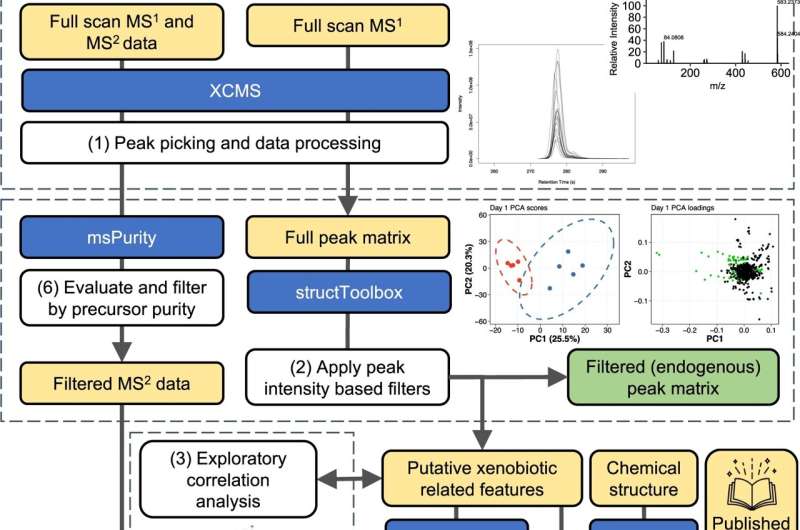This article has been reviewed according to Science X's editorial process and policies. Editors have highlighted the following attributes while ensuring the content's credibility:
fact-checked
peer-reviewed publication
trusted source
proofread
Creation of unique data process provides insight to improve understanding of drugs' impact on body

Scientists have created a new way to provide valuable insights into how drugs are processed in the body and how the body responds to these drugs, in a single test.
Researchers built upon 'untargeted metabolomics' which traditionally tracks molecules known as metabolites that play important roles in bodily processes, like energy production and growth.
Their results revealed detailed maps of how the drugs are transformed in the body, how their levels change over time, and how these changes are directly related to the body's biochemical responses to the drugs.
Publishing their findings in Nature Communications, the team from the University of Birmingham and global biopharmaceutical company, AstraZeneca, used data gathered from mass spectrometry applied to biological samples to track the metabolism of various pharmaceuticals—discovering both previously reported and new biotransformation products of the drugs.
The process also allowed researchers to discover a link between levels of sunitinib and sphingomyelins—molecules involved in tissue development, cell recognition and adhesion—providing evidence of a role for sphingomyelins in sunitinib-induced cardiotoxicity.
Senior author Mark Viant, Professor of Metabolomics at the University of Birmingham, commented, "Our study shows how untargeted metabolomics can provide valuable insights into how the body processes chemicals and in the same test learn how those chemicals influence our biochemistry."
"The approach will not only be useful for understanding the fate and effects of drugs, but can be applied more widely in toxicology to study how the body responds to exposure to foreign substances (xenobiotics). It could be a valuable tool in drug safety and development, but also in industrial chemical safety."
Co-author Amy Pointon, Head of Cell and Gene Therapy Safety at AstraZeneca, commented, "The approach of simultaneously obtaining mechanistic insight and assessment of drug substance from one sample will provide valuable information into pharmacokinetic and pharmacodynamic relationships previously unexplored. This gives the potential to bridge pre-clinical to clinical translation, enabling earlier prediction of drug effects and further development of quantitative approaches within drug discovery."
More information: Tara J. Bowen et al, Simultaneously discovering the fate and biochemical effects of pharmaceuticals through untargeted metabolomics, Nature Communications (2023). DOI: 10.1038/s41467-023-40333-7




















